Thyroid Disease Awareness Month - how to take care of yourself?
January is thyroid disease awareness month. How to take care of this organ?


Learn more about our editorial process
.

Learn more about our editorial process
.

Learn more about our editorial process
.

Learn more about our editorial process
.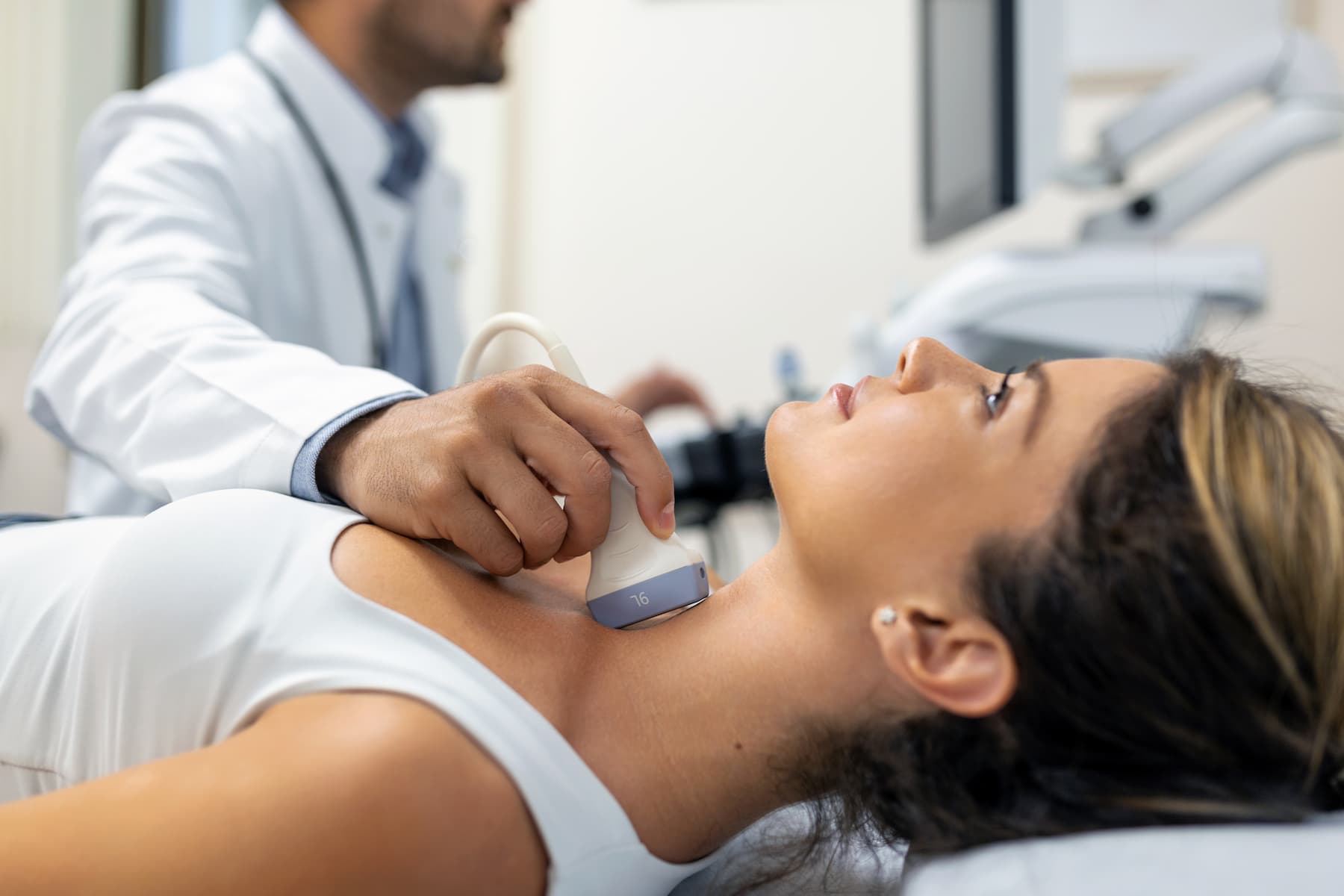
Why you can trust us
Articles on Natu.Care are written based on scientific research, data from government websites and other reliable sources. The texts are written in cooperation with doctors, nutritionists and other health and beauty experts. Articles are reviewed before publication and during significant updates.
.Learn more about our editorial process
.Information about advertisements
Content on Natu.Care may contain links to products from the sale of which we may receive a commission. When creating content, we adhere to high editorial standards and take care to be objective about the products discussed. The presence of affiliate links is not dictated by our partners, and we select the products we review ourselves completely independently.
.Learn more about our terms and Conditions
.It looks like a butterfly, you could fit it in the palm of your hand and is responsible for numerous functions in the body. And unfortunately, more and more people are suffering from diseases related to it.
This is why January has been claimed thyroid disease awareness month. How much do you know about this small, inconspicuous organ? Together with doctor, Kacper Nihalani, we will give you the most important information about the thyroid gland, its diseases and how to take care of it - in 10 easy steps.
From this article you will learn:
- What the thyroid gland is and how many people suffer from it.
- What it does.
- What functions the thyroid gland performs in the body.
- What the thyroid gland does.
- What are the symptoms of the most common thyroid diseases.
- How to care for the thyroid gland.
- How to take care of prevention of thyroid diseases. .

Sprawdź, za co pokochały go tysiące klientek Natu.Care Premium Omega-3ᵀᴳ -15% z kodem BLOG15
Natu.Care Omega-3ᵀᴳ Premium
Natu.Care Omega-3ᵀᴳ Premium dla zdrowia serca, mózgu i odporności. Najlepsza przyswajalność. Optymalna dawka 750 mg. Przebadana przez niezależne laboratorium.
Zobacz więcej
Produkt ma super skład, transparentną etykietę i co dla mnie jest ważne – małe kapsułki do połknięcia. Nie ma też nieprzyjemnego efektu odbijania rybą, który miałam spożywając inne produkty. Widzę znaczną poprawę odporności. Polecam!@Kasia P.
See also:
.
January - Thyroid Disease Awareness Month
.
About 400 million people worldwide suffer from hypothyroidism. Moreover, it is estimated, that a second as many remain undiagnosed. The organisation American Thyroid Association reports that in the United States alone, 12% of the population suffers from problems with this organ, with 60% of people not being aware of itand.
That's probably a good reason to spend a whole month building awareness of thyroid disease, isn't it?
.
You're about to find out why this organ is so important. But in a nutshell: the thyroid gland produces hormones that regulate the body's growth and development. It also influences the rate of metabolism. It has important functions in controlling the heart, muscles and digestive system. It maintains brain and bone health.
So, if it stops working... it gets really bad. And in some cases, regular checkups are all it takes to put out the fire in time to put out the fire. But let's start at the beginning.
What is the thyroid gland?
.
The thyroid gland is a small, butterfly-shaped gland located at the front of the neck, just below the larynx. It is part of the endocrine system, a group of glands that produce and secrete hormones into the bloodstreamand.
Thyroid gland in numbers
.
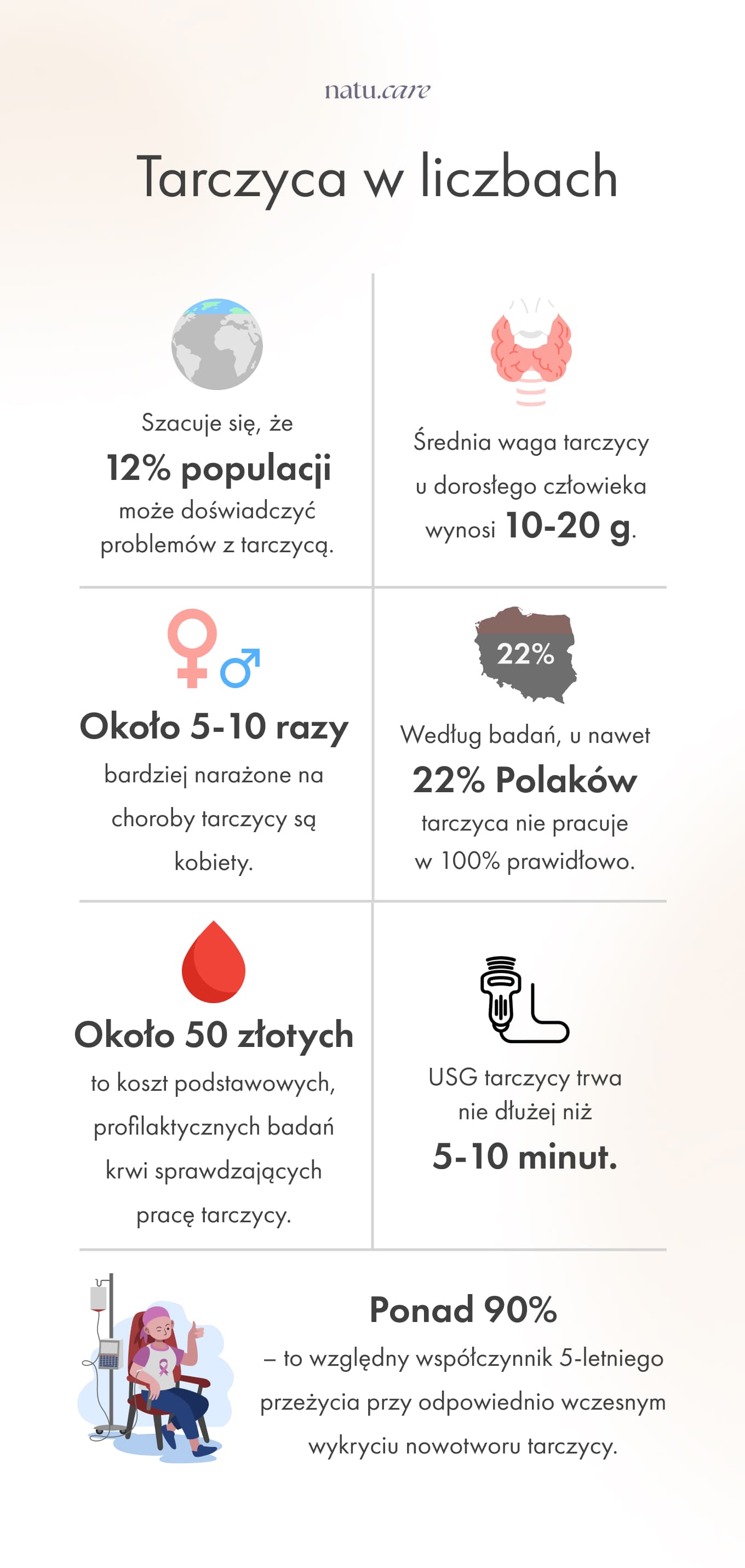
- The average weight of the thyroid gland in an adult human is 10-20 g.
- It is estimated that 12% of the population may experience thyroid problems.
- It is estimated that 12% of the population may experience thyroid problems.
- About 5-10 times more likely to experience thyroid disease are women.
- Research suggests, that in up to 22% of Poles, the thyroid gland is not working 100% properly.
- About 50 PLN is the cost of a basic, preventive blood test to check thyroid functionand.
- The thyroid ultrasound takes no longer than 5-10 minutes. .
- More than 90% -that's the relative 5-year survival rate when thyroid cancer is detected early enoughand.
There will be approximately 43,000 thyroid cancer diagnoses in 2023..

Kacper Nihalani doctor
.
Natu.Care Collagen Premium 5000 mg, mango & passion fruit

- Collagen content: 5000 mg marine collagen hydrolysate
- Additional active ingredients: vitamin C, low molecular weight hyaluronic acid (and L-theanine and coenzyme Q10 in cocoa flavoured collagen or vitamin A and vitamin E in mango–passion fruit flavoured collagen)
- Form: powder sachets
- Dose: 1 sachet per day
- Sufficient for: 30 days
Product description
Fish collagen from the Natu.Care brand in a dose of 5000 mg, based on certified ingredients of the best quality. Regular supplementation will positively influence the appearance of the skinóry, hairów and nails – they will be rebuilt and strengthened from the inside.
In addition to collagen, which is valuable for health and beauty, it also offers other active ingredients that help to maintain a youthful complexion, shiny hair and strong nails.
The formula contains a sufficient portion of the active ingredient to positively affect joints, the musculoskeletal system and immunity.
Natu.Care Premium Collagen is available in two flavours – Cacao Bloom and Rise&Shine. Both formulas are based on the following active ingredients: marine collagen hydrolysate, wild roseóbud extract and hyaluronic acid.
Additionally, Cacao Bloom contains natural L-theanine, coenzyme Q10 and defatted Dutch cacao. Rise&Shine instead contains vitamin E and vitamin A.
These are the best collagens in the world.
These best fish collagens on the market also rós taste – Cacao Bloom is a treat for chocolate lovers. Rise&Shine will appeal to those whoólike the refreshing taste of mangoófruit and passion fruit.
Pros and cons
Pros:
- Vitamin C supports the body's collagen production, enhancing its effectiveness.
- An effective dose of hyaluronic acid, which additionally supports skin hydration and joint health.
- Fish collagen absorbs 50% better. Additionally, the manufacturer specifies the fish species it is sourced from (Atlantic cod).
- The composition has been tested by the independent and accredited J.S. Hamilton laboratory.
- MSC (Marine Stewardship Council) quality certification, which confirms that the collagen source supports sustainable fishing practices.
Cons:
- None.
Additional information
Natu.Care's fish collagen receives praise for its delicious taste. You won't find the fishy aftertaste that often comes through in other collagens. Plus, you have two tasty flavors to choose from: cocoa and mango-passionfruit.
Active ingredients like coenzyme Q10, hyaluronic acid, and natural L-theanine provide anti-inflammatory and antioxidant benefits while slowing down aging processes.
User review
Super, after about 6 weeks of use, the skin on my face became noticeably firmer. Wonderful taste.
Ania ZalewskaNatu.Care customer
Natu.Care Premium collagen 10 000 mg, mango-maracuja

- Collagen content: 10,000 mg marine collagen hydrolysate
- Additional active ingredients: vitamin C, low molecular weight hyaluronic acid (and L-theanine and coenzyme Q10 in cocoa flavoured collagen or vitamin A and vitamin E in mango–passion fruit flavoured collagen)
- Form: powder sachets
- Dose: 1 sachet per day
- Sufficient for: 30 days
Product description
One of the strongest collagens on the market, whichós provides as much as 10,000 mg in a daily serving. This allows the formula to effectively support the condition of the skin, hair and nails.
With this supplement, you will support your beauty, which will allow you to visually stop the ageing process and feel a second youth!
Natu.Care Collagen Premium 10 000 mg comes in two flavours – cherry and mango-maracuja. Both formulas have the same product backbone – collagen, hyaluronic acid and vitamin C.
In the cherry version you additionally find glucosamine, chondroitin and Indian frankincense resin extract. Mango-maracuja, on the other hand, contains vitamin E and vitamin A.
Pros and cons
Pros:
- Tested collagen formula – SeaGarden, whose effects have been confirmed in clinical studies.
- Effective dose of hyaluronic acid, additionally moisturizing the skin and positively impacting joint health.
- Vitamin C supports the body’s natural collagen production.
- The composition has been tested by the independent and accredited J.S. Hamilton laboratory.
- The product has an MSC (Marine Stewardship Council) quality certification – the collagen source supports sustainable fishing practices.
Cons:
- None.
Additional information
Users praise Natu.Care Collagen Premium for the easy dissolvability of the powder.
User review
I noticed a significant improvement in my skin texture after a few weeks of taking collagen regularly. My complexion is now as soft as velvet!
Natu.Care Collagen Premium 10000 mg, cherry

- Collagen content: 10,000 mg of hydrolyzed bovine collagen
- Additional active ingredients: vitamin C, low molecular weight hyaluronic acid, glucosamine, chondroitin, extract of Indian frankincense resin (boswellia serrata)
- Form: powder sachets for drinking
- Serving: 1 sachet per day
- Lasts for: 30 days
Product description
One of the strongest collagens on the market, providing as much as 10,000 mg per daily serving. This product can effectively support the condition of joints, skin, hair, and nails.
With this supplement, you will support your skeletal and joint system as well as your beauty, helping you visually halt the aging process and feel rejuvenated!
Pros and cons
Pros:
- The daily portion of collagen is very large – as much as 10,000 mg.
- Proven collagen formula – COLLinstant, whose effectiveness has been confirmed in clinical studies.
- Effective dose of hyaluronic acid, which additionally moisturizes the skin and positively affects joint health.
- Vitamin C supports the body's natural collagen production.
- Glucosamine is a fundamental building block of compounds found in joint cartilage and a component of collagen that gives elasticity to connective tissue in tendons.
- Chondroitin is a natural component found in the human body, mainly in cartilage. This large molecule (mucopolysaccharide) has the ability to absorb water, which helps maintain the elasticity and resilience of cartilage.
- Frankincense resin extract supports blood circulation and joint mobility and reduces their stiffness. It may help alleviate inflammatory conditions.
- The composition has been tested by the independent and accredited J.S. Hamilton laboratory.
Cons:
- None.
Additional information
Users praise Natu.Care Collagen Premium for the easy dissolving of the powder.
Premium Sodium Butyrate
Product description
Premium Sodium Butyrate is a natural support for your digestive system. With a high dose of butyric acid (940 mg), it supports the regeneration of the intestinal mucosa, improving gut health and function, and aids in the absorption of nutrients. By taking care of your intestines, you're taking care of the health of your entire body.
Studies involving people suffering from irritable bowel syndrome confirm that sodium butyrate is ideal for supporting issues related to bacterial flora imbalances (for example, after antibiotic therapy), constipation and diarrhea, inflammation of the intestinal mucosa, or a diet low in fiber.
Premium Sodium Butyrate capsules are made using the innovative DRcaps® technology. This guarantees that the active ingredients in the product are protected from the destructive effects of stomach acids and digestive enzymes. As a result, we can be sure that the beneficial ingredients are released in the small intestine and are fully absorbed by our body.
Premium Sodium Butyrate from Natu Care is 100% tested, and its composition contains only the highest quality raw materials.
Pros and cons
Pros:
- Supports digestive system function
- Helpful for various gastrointestinal conditions, including IBS
- High dose of butyric acid in each capsule
- Eco-friendly, clean, and tested composition
- Free from added sugar, gluten, GMOs, and lactose
- Innovative capsule technology - DRcaps
Cons:
- None
Additional Information
Take 3 capsules daily at any time of the day, preferably with a meal. Swallow the capsules whole with water.
Premium Sodium Butyrate is intended for adults.
The product should be used under medical supervision.
User review
I've been using the product for 2 weeks. My stomach feels lighter, and my digestion has improved. I recommend it.
Natu.Care Premium Magnesium + Vitamin B6

- Magnesium content per day: 305 mg
- Additional active ingredients: Vitamin B6 (2.1 mg)
- Form: capsules
- Serving size: 3 capsules per day
- Sufficient for: 30 days
Product description
The Premium Magnesium + Vitamin B6 dietary supplement is a comprehensive product that combines three organic forms of magnesium (citrate, malate, and diglycinate) and vitamin B6 in highly absorbable forms.
Magnesium is an essential mineral without which our bodies cannot function properly. It supports the immune, nervous, and muscular systems, maintains electrolyte balance, and is involved in cell division and the regulation of mental functions.
Research shows that magnesium supplementation is even more effective when accompanied by vitamin B6, which is included in our product. Vitamin B6 is responsible for the proper functioning of the nervous and immune systems, as well as the proper functioning of the heart.
If you want to safely get rid of feelings of fatigue, concentration problems, hair loss, muscle cramps, trembling, or irritability, reach for Premium Magnesium from Natu.Care, tested by the independent, certified laboratory J.S. Hamilton Poland.
Pros and cons
Pros
- Supports the proper functioning of the nervous and immune systems.
- Reduces feelings of fatigue and tiredness.
- Maintains proper psychological functions.
- The purity of the ingredients (free from anti-caking agents, artificial fillers, and additives such as titanium dioxide, microcrystalline cellulose, talc, magnesium stearate, and silicon dioxide) has been confirmed by laboratory tests.
- High absorption of ingredients.
- Soft capsules that are easy to swallow.
- Suitable for vegetarians and vegans.
Cons
- None.
Additional information
Take with a meal, 3 capsules per day.
The capsules should be taken with at least 250 ml of water.
If you have trouble sleeping, it is advisable to take 1 capsule in the morning and 2 capsules in the evening, no later than 4 hours before bedtime.
Avoid combining with products high in calcium (milk, yogurt, cheese), as this may negatively affect magnesium absorption.
Pregnant and breastfeeding women should consult a doctor before starting supplementation.
User review
I’m very impressed with the speed of delivery. The product itself is of high quality and absorbs well. After two weeks of supplementation, I’ve noticed a significant improvement in muscle recovery, especially during periods of intense training. I highly recommend it!
Product description
The dietary supplement contains omega-3ᵀᴳ, or omega-3 acids in the form of trójglyceridesów. Scientific studies suggest that this form of fatty acidsós up to 2 times better absorbed than the estersós present in many dietary supplements on the market. This means that you are assured of their effectiveness and of supplying yourself with valuable omega acids.
Fatty acids omega-3 are derived from wild anchovy oil. It is a rich source of healthy fats that are essential for the health of the cardiovascular, immune and nervous systems, as well as the proper function of vision, joints muscles.
Scientific research suggests that wild anchovies are a good source of healthy fats.
Scientific research also suggests that an adequate intake of omega-3 fatty acidsós protects against and supports the treatment of depression and anxiety disorders. In addition, omega-3s influence the hydration and appearance of the skinóry and support healthy sleep.
.
The formula contains a total of 750 mg of EPA+DHA acidsós, which is three times higher than the recommended minimum of 250 mg for the Polish population. Omega-3 TG Premium has studies indicating that its TOTOX is 9, which is a very good result.
Supplementation of omega-3 fatty acidsóis recommended for anyone who does not eat 1–2 portions (approximately 300 g) of oily fish per week. Children during growth, seniors, physically active people, vegans and vegetarians, as well as patients undergoing cardiovascular treatment and prevention of heart disease also have an increased need.
Pros and cons
The dietary supplement contains omega-3ᵀᴳ, or omega-3 acids in the form of trójglyceridesów. Scientific studies suggest that this form of fatty acidsós up to 2 times better absorbed than the estersós present in many dietary supplements on the market. This means that you are assured of their effectiveness and of supplying yourself with valuable omega acids.
Fatty acids omega-3 are derived from wild anchovy oil. It is a rich source of healthy fats that are essential for the health of the cardiovascular, immune and nervous systems, as well as the proper function of vision, joints muscles.
Scientific research suggests that wild anchovies are a good source of healthy fats.
Scientific research also suggests that an adequate intake of omega-3 fatty acidsós protects against and supports the treatment of depression and anxiety disorders. In addition, omega-3s influence the hydration and appearance of the skinóry and support healthy sleep.
.
The formula contains a total of 750 mg of EPA+DHA acidsós, which is three times higher than the recommended minimum of 250 mg for the Polish population. Omega-3 TG Premium has studies indicating that its TOTOX is 9, which is a very good result.
Supplementation of omega-3 fatty acidsóis recommended for anyone who does not eat 1–2 portions (approximately 300 g) of oily fish per week. Children during growth, seniors, physically active people, vegans and vegetarians, as well as patients undergoing cardiovascular treatment and prevention of heart disease also have an increased need.
Additional information
The dietary supplement contains omega-3ᵀᴳ, or omega-3 acids in the form of trójglyceridesów. Scientific studies suggest that this form of fatty acidsós up to 2 times better absorbed than the estersós present in many dietary supplements on the market. This means that you are assured of their effectiveness and of supplying yourself with valuable omega acids.
Fatty acids omega-3 are derived from wild anchovy oil. It is a rich source of healthy fats that are essential for the health of the cardiovascular, immune and nervous systems, as well as the proper function of vision, joints muscles.
Scientific research suggests that wild anchovies are a good source of healthy fats.
Scientific research also suggests that an adequate intake of omega-3 fatty acidsós protects against and supports the treatment of depression and anxiety disorders. In addition, omega-3s influence the hydration and appearance of the skinóry and support healthy sleep.
.
The formula contains a total of 750 mg of EPA+DHA acidsós, which is three times higher than the recommended minimum of 250 mg for the Polish population. Omega-3 TG Premium has studies indicating that its TOTOX is 9, which is a very good result.
Supplementation of omega-3 fatty acidsóis recommended for anyone who does not eat 1–2 portions (approximately 300 g) of oily fish per week. Children during growth, seniors, physically active people, vegans and vegetarians, as well as patients undergoing cardiovascular treatment and prevention of heart disease also have an increased need.
Expert opinion
The dietary supplement contains omega-3ᵀᴳ, or omega-3 acids in the form of trójglyceridesów. Scientific studies suggest that this form of fatty acidsós up to 2 times better absorbed than the estersós present in many dietary supplements on the market. This means that you are assured of their effectiveness and of supplying yourself with valuable omega acids.
Fatty acids omega-3 are derived from wild anchovy oil. It is a rich source of healthy fats that are essential for the health of the cardiovascular, immune and nervous systems, as well as the proper function of vision, joints muscles.
Scientific research suggests that wild anchovies are a good source of healthy fats.
Scientific research also suggests that an adequate intake of omega-3 fatty acidsós protects against and supports the treatment of depression and anxiety disorders. In addition, omega-3s influence the hydration and appearance of the skinóry and support healthy sleep.
.
The formula contains a total of 750 mg of EPA+DHA acidsós, which is three times higher than the recommended minimum of 250 mg for the Polish population. Omega-3 TG Premium has studies indicating that its TOTOX is 9, which is a very good result.
Supplementation of omega-3 fatty acidsóis recommended for anyone who does not eat 1–2 portions (approximately 300 g) of oily fish per week. Children during growth, seniors, physically active people, vegans and vegetarians, as well as patients undergoing cardiovascular treatment and prevention of heart disease also have an increased need.
Natu.Care Vitamin D 2000 UI
Product description
Vitamin D plays a crucial role in our health and well-being. It affects calcium and phosphate metabolism, which translates to healthy bones and teeth. It also helps regulate the immune system, and studies indicate its influence on the functioning of the nervous system.
Vitamin D, although called a “vitamin,” is actually a prohormone that our body produces on its own, primarily under the influence of sunlight. Unfortunately, our modern lifestyle contributes to deficiencies of this essential vitamin. Working in enclosed office buildings, using (necessary!) SPF creams, and covering the body with clothing all make it very difficult, if not impossible, to obtain adequate levels of vitamin D from sunlight. This is why appropriate, year-round supplementation is so crucial.
Vitamin D from Natu.Care is a well-tested vitamin D3 suspended in safflower oil, a plant known for its numerous health benefits. The convenient, easy-to-swallow capsule will make supplementation a part of your daily, healthy routine, improving your overall well-being.
Pros and cons
Pros:
- Ensures proper functioning of the immune system
- Supports the maintenance of healthy bones and teeth
- Maintains proper heart, kidney, and muscle function
- Tested by an independent, certified laboratory
- Convenient and easy-to-swallow capsule
- Clean composition - free from added sugar, gluten, GMOs, lactose, and without preservatives or colorants
Cons:
- None.
Additional Information
Pregnant women and breastfeeding mothers should consult a doctor before using the product. This dietary supplement is intended for a healthy adult population up to the age of 75.
Collagen Booster - Glow Stories

- Active ingredients: bamboo shoot extract, Quatrefolic®, L-Methionine, L-cysteine, vitamin E, vitamin A, niacin (vitamin B3), vitamin B6, vitamin B2 (riboflavin), biotin, zinc, copper
- .
- Form: capsules
- .
- Dose: 1 capsule per day
- .
- Sufficient for: 60 days
- .
Product description
A dietary supplement containing vitamins, minerals and plant extracts thatósupport the skinóhand, hair and nails. The product is especially distinguished by the form of folate – it is Quatrefolic, whichós absorbed very well and is natural.
In addition to valuable vitamins and minerals, such as vitamin A, E, B3, B2 and biotin, the formula contains bamboo shoot extract, whichóry further enhances your beauty.
Pros and cons
A dietary supplement containing vitamins, minerals and plant extracts thatósupport the skinóhand, hair and nails. The product is especially distinguished by the form of folate – it is Quatrefolic, whichós absorbed very well and is natural.
In addition to valuable vitamins and minerals, such as vitamin A, E, B3, B2 and biotin, the formula contains bamboo shoot extract, whichóry further enhances your beauty.
Additional information
A dietary supplement containing vitamins, minerals and plant extracts thatósupport the skinóhand, hair and nails. The product is especially distinguished by the form of folate – it is Quatrefolic, whichós absorbed very well and is natural.
In addition to valuable vitamins and minerals, such as vitamin A, E, B3, B2 and biotin, the formula contains bamboo shoot extract, whichóry further enhances your beauty.
Functions of the thyroid gland in the body
.
The thyroid gland is a key endocrine gland in the body, responsible for producing important hormones and regulating many essential functions.
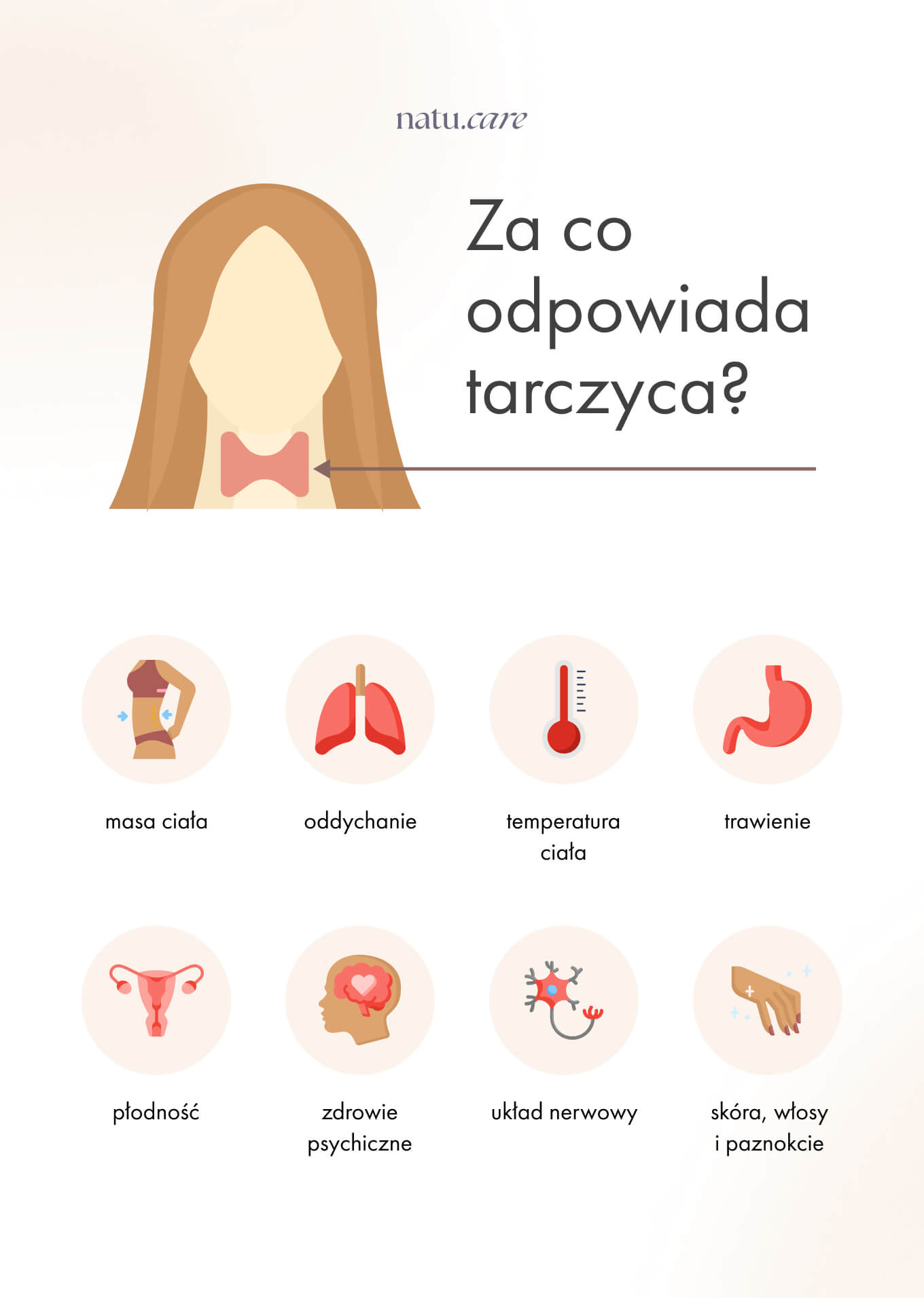
What tasks does the thyroid gland perform?
.
Produces hormones
.
The thyroid gland is a gland that produces two important hormones: triiodothyronine (T3) and thyroxine (T4). These regulate, among other things, metabolic rate, physical growth and development, and nervous system function.
Regulates metabolism
.
Thyroid hormones, mainly triiodothyronine (T3) and thyroxine (T4), play a key role in regulating the rate of metabolism, also known as metabolism. This is the process by which the body converts food into energy and then uses it to carry out various tasks such as digestion, tissue repair or maintaining body temperatureand.
T3 and T4 stimulate metabolism while supporting the body's energy use. They act on almost all cells in the body, supporting their metabolic initiative. As a result, they regulate the rate at which the body burns calories - both at rest and during physical activity. This means they can affect body weight, energy levels and overall body conditionand.
Disturbances in the production of these hormones - both excess and deficiency - can lead to serious health problems. An excess of thyroid hormones speeds up metabolism, which usually leads to weight loss despite increased appetite, as well as excessive agitation and anxiety. On the other hand, hormone deficiency slows down the metabolism, causing weight gain, fatigue and feeling coldand.
In some cases, fluctuations in thyroid hormones can be life-threatening. A good example is the so-called thyroid storm - a process caused by an excess of thyroid hormones in the body. It is most often led to by an overdose of hypothyroidism medication or a local inflammatory process..
 .
.
Kacper Nihalani doctor
.
In younger people, excess thyroid hormones are mainly manifested by seizures and anxiety. Older patients, on the other hand, are more likely to experience cardiovascular symptoms such as tachycardia or hypertension, the doctor adds.
Influences on growth and development
.
Thyroid hormones are important for the normal growth and development of the body, in particular the nervous system and the skeleton. Already in the prenatal period, they have a decisive influence on the formation of the brain and nervous system, and their deficiency can lead to permanent impairments of neural functions, such as stunted intellectual development or problems with motor coordinationand.
Thyroid hormones also interact with growth hormones to regulate physical maturation. They have important functions in bone and muscle development, influencing the rate of growth. They are also responsible for bone metabolism, supporting bone remodelling and maintaining adequate levels of calcium and phosphorus, which is crucial for skeletal healthand.
Promotes mental health
.
Research suggests that thyroid dysfunction can lead to a variety of emotional and mental health problems, such as depression, anxiety and even psychiatric disorders. Thyroid hormones regulate a number of neurotransmitters that are important for the proper functioning of the nervous system, as well as emotionsand.
Endocrine disorders such as hypothyroidism (hypothyroidism) or hyperthyroidism (hyperthyroidism) are often associated with psychological problems. In the case of hypothyroidism, a lack of thyroid hormones can lead to a slowing down of metabolic and mental processes, manifesting as feelings of coldness, fatigue, excessive sleepiness, apathy and even depressive symptomsand.
On the other hand, excess thyroid hormones in cases of hyperthyroidism can lead to an accelerated heart rate, sweating, anxiety, irritability and even manic states. Proper diagnosis and treatment of these disorders is therefore important for maintaining mental healthand.
Helps the cardiovascular system
.
Thyroid hormones directly affect heart rate (heart rate), strength of heart muscle contractions and overall vascular function .
Hypothyroidism is not uncommonly manifested by an accelerated heartbeat (tachycardia), excessive sweating and elevated blood pressure. On the other hand, hypothyroidism can lead to a slowed heart rate (bradycardia), lower blood pressure and a general feeling of fatigue and weaknessand.
How else does the thyroid gland workand?
.
- .
- Responsible for regulating the menstrual cycle in women. .
- Influences reproductive function in women, including ovulation. .
- Promotes skin health by influencing skin elasticity and hydration.
- Promotes skin health by influencing skin elasticity and hydration.
- Promotes immune system function. .
- Influences the maintenance of normal body temperature. .
- Plays an important role in maintaining energy levels.
- Regulates the concentration of cholesterol in the body. .
The thyroid gland is also responsible for libido and proper sleep..
 .
.
Kacper Nihalani doctor
.
What are the most common thyroid diseases?
.
One of the most common thyroid conditions are Hashimoto's and Graves' disease, as well as hyper- and hypothyroidism. They usually affect women, but can also occur in men. What are the characteristics of these conditions?
Hashimoto's disease
.

Hashimoto's disease is an autoimmune disorder, a condition in which the immune system attacks the thyroid gland. It is the most common cause of hypothyroidism and one of the most common autoimmune diseasesand.
To date, it has not been possible to pinpoint the exact causes of the development of Hashimoto's disease. However, doctors indicate that it may be triggered by a malfunctioning immune system. Some people may also be genetically predisposed to the disease, especially if they have a family history of other autoimmune diseasesand.
Some sources indicate that women are up to 10 times more likely to develop the condition than men. In addition, exposure to ionising radiation or certain chemicals (e.g. pesticides or heavy metals) and drugs (e.g. amiodarone) may increase the risk of developing Hashimoto's disease .
Symptoms
.
Hashimoto's is a disease that develops slowly, so its symptoms may be non-specific or confused with other ailments. Symptoms also tend to vary depending on the severity of the condition.
The most common symptoms of Hashimoto's areand:
.
- Fatigue and lethargy. .
- Weight gain. .
- Menstrual abnormalities.
- Depression or anxiety.
- Depression or mood changes.
- Depression or mood changes.
- Sensitivity to cold.
- Sensitivity to cold.
- Dry and thickened skin. .
- Oedema of the face.
- Facial swelling.
- Constipation.
- Discomfort.
- Pain, stiffness or swelling of the joints.
- Pain, stiffness or swelling of the joints.
- Hair loss and brittle nails.
- Problems with memory and concentration. .
Remember, however, that with proper medical care and the use of well-chosen medications, these symptoms can disappear altogether.
Treatment
.
Treatment of Hashimoto's disease consists primarily of pharmacological supplementation of thyroid hormone deficiency. The most commonly used is levothyroxine, a synthetic form of the thyroid hormone T4, which is independently converted in the body into the active form of the hormone T3. The dose of the drug is determined by the doctor individually for each patient, based on regular blood tests and the patient's wellbeingand.
Although Hashimoto's disease is incurable, patients are able to lead normal, healthy lives by following their doctor's advice and having regular blood tests.
In some cases - with severe enlargement of the thyroid gland or the appearance of nodules - it may be necessary to surgically remove part or all of the thyroid gland. After such surgery, too, you will need to take levothyroxine for life to provide your body with the necessary thyroid hormonesand.
.
Graves-Basedov disease
.
Graves-Basedov disease is an autoimmune disease in which the body produces antibodies that stimulate the thyroid gland to overproduce hormones. The causes leading to this condition are not yet fully knownand.
Research, however, suggests, that both genetic and environmental factors are responsible for the development of Graves-Basedow disease. The risk of the condition is determined by factors including gender (up to four times as many women as men have the disease), age and a family history of autoimmune diseaseand.
The risk of developing Graves' disease is also determined by the family history of autoimmune disease.
Symptoms
.
Most of the symptoms present with Graves' disease are very similar to those present with hyperthyroidism. What does the patient usually experience?
Symptoms of Graves' diseaseand:
- Accelerated heartbeat.
- Muscle tremor.
- Muscle trembling.
- Fast and uncomfortable.
- Sudden and unexpected weight loss despite increased appetite.
- Increased sweating.
- Increased sweating and intolerance to heat.
- Increased sweating and intolerance to heat.
- An enlarged thyroid gland (goiter). .
- Inregular menstruation in women. .
- Erectile dysfunction in men.
- Erectile dysfunction in men.
- General fatigue or weakness. .
Treatment
.
Treatment of Graves' disease is aimed at reducing the production of thyroid hormones and alleviating symptoms. Antithyroid drugs that inhibit thyroid hormone production, such as methimazole or propylthiouracil, are most commonly used. The dose and length of treatment is determined by the doctor based on the individual patient's conditionand.
Another treatment is therapy with iodine radioactive iodine, which destroys thyroid cells, thereby reducing hormone production .
.
Sometimes it also becomes necessary to surgically remove part or all of the thyroid gland. Patients who have undergone such procedures must take medication containing synthetic thyroid hormones for the rest of their lives to ensure the body functions properly .
Hypothyroidism
.

Hyperthyroidism, also known as hyperthyroidism, is a condition in which the thyroid gland produces too much of the hormones thyroxine (T4) and triiodothyronine (T3). These hormones are crucial for many bodily functions, but an excess can be very dangerous to healthand.
There are several causes of hyperthyroidism, but the most common are autoimmune conditions such as Graves-Basedow disease, in which the immune system attacks the thyroid gland, leading to excessive hormone production .
.
Other reasons include excess iodine (an ingredient the thyroid gland uses to produce hormones), thyroid hormone-producing nodules, or excessive TSH stimulating thyroid hormone production .
The most common cause of hyperthyroidism is taking levothyroxine in excessive doses..
 .
.
Kacper Nihalani doctor
.
Symptoms
.
Hypothyroidism causes an acceleration of most metabolic processes in the body, resulting in a range of symptoms. People with this condition typically experience a variety of symptoms, so some may be confused with other health conditions.
Symptoms of hyperthyroidismand:
- Sudden and unexpected weight loss. .
- Accelerated or irregular heart rate.
- Increased appetite.
- Increased appetite.
- Increased appetite.
- Nervousness, restlessness, and irritability. .
- Trembling (especially in the hands and fingers).
- Menorrhoea.
- Changes in the menstrual cycle. .
- Increased sweating. .
- Intolerance to high temperatures.
- Intolerance to high temperatures.
- Fatigue and muscle weakness.
- Fatigue and muscle weakness.
Treatment
.
Treatment of hyperthyroidism aims to reduce and control hormone production. The most common drugs used are drugs - such as methimazole - that inhibit the production of thyroid hormonesand.
Another common treatment for hyperthyroidism is radioactive iodine therapy. During treatment, the patient takes food or liquid containing radioactive iodine, which destroys thyroid cells, thereby reducing hormone productionand.
.
In some cases it may be necessary to surgically remove part or all of the thyroid gland. After such surgery, it is necessary to take synthetic thyroid hormone for the rest of your life to compensate for the lack of natural hormone production .
Hypothyroidism
.

Hypothyroidism, also known as hypothyroidism, is a condition in which the thyroid gland does not produce enough hormones. When their levels are too low, many bodily functions slow down, leading to a variety of symptomsand.
The most common cause of hypothyroidism is Hashimoto's thyroiditis. This is an autoimmune disease in which the body mistakenly attacks its own organ (the thyroid gland), leading to gradual cell damage and too little hormone production .
Other causes may include treatment of thyroid disease with radioactive iodine or thyroid surgery, which is performed for various conditions such as Graves' disease, thyroid nodules or thyroid cancer .
.
Rarely, hypothyroidism may result from insufficient iodine in the diet (iodine is an essential component of thyroid hormones) or problems with the pituitary gland, which produces thyroid-stimulating hormone (TSH) .
Symptoms
.
The symptoms of hypothyroidism can sometimes be confused with other conditions. The symptoms present also depend on the severity of the hypothyroidism. Nevertheless, there are a few typical signs of this condition. What can be usually expected?
Symptoms of hypothyroidismand:
- Fatigue and weakness. .
- Weight gain (often despite reduced appetite).
- Weight loss.
- Sensitivity to cold.
- Sensitivity to cold.
- Dryness and roughness of the skin. .
- Hair loss. .
- Constipation. .
- Depression and mood changes. .
- Sleep disturbances, such as daytime sleepiness. .
- Difficulties with concentration, memory problems. .
- Pain, stiffness or swelling in the joints.
- Pain, stiffness or swelling in the joints.
- Muscle cramps. .
- Disorders of the menstrual cycle. .
Treatment
.
Treatment of hypothyroidism mainly consists of giving the patient thyroid hormones, especially levothyroxine. Dosage is individual - it depends on the patient's age, condition and response to therapyand.
In the initial phase of treatment, the doctor checks thyroid hormone levels every 6-8 weeks or so to adjust the dose accordingly. This allows the body's thyroid hormone levels to reach optimal levels, so that normal body function can be restored without symptoms of the disease .
.
For hypothyroidism, therapy usually lasts for the patient's lifetime. However, once a fixed dose is established, follow-up blood tests are performed less frequently, generally 1-2 times a year .
What other thyroid diseases are thereand?
.
- Thyroid tumours. They can present as one or multiple tumours growing within the thyroid gland. They are usually harmless, but should always be carefully examined by a doctor.
- Malignant thyroid cancer. This is a relatively rare type of cancer, but the incidence is increasing every year. Thyroid cancer requires various forms of treatment (depending on the patient's condition and type of disease), such as surgery, iodine therapy, radiotherapy, chemotherapy or targeted therapy.
- Thyroid goiter. It is an enlargement of the thyroid gland that can be seen on the neck. It can be caused by iodine deficiency, nodules or inflammation.
- Thyroid goiter.
- Orthritis and subacute thyroiditis. These are inflammations of this organ that develop most often in the course of an infection (viral, bacterial, fungal).
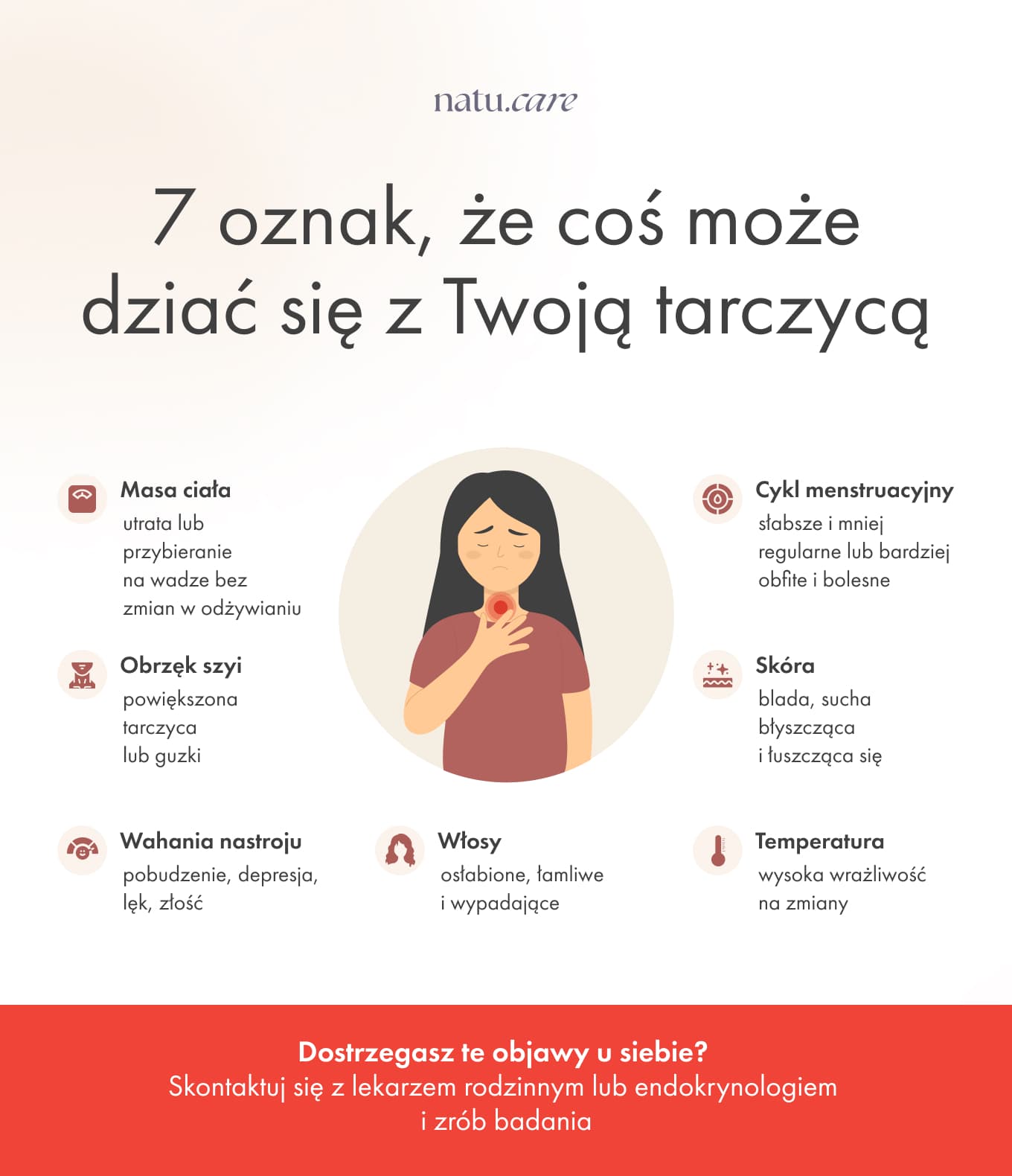
Prevention of thyroid disease, or 10 steps to health
.
Prevention of thyroid diseases is a key part of taking care of your health. Controlling the function of this organ and keeping it in good shape will minimise the risk of disease. Learn the 10 simple steps to help take care of your thyroid health.
1. Balanced diet
.
A balanced diet is the first step to effective thyroid disease prevention. A good diet is one that contains all the essential nutrients for the proper functioning of this gland: protein, healthy fats, carbohydrates, vitamins and minerals, including iodine and selenium, which are essential for a healthy thyroidand.
Iodine is particularly important. It is responsible for the production of thyroid hormones, and a deficiency can lead to what is known as goiter (enlargement of the thyroid gland). It is mainly found in seafood, eggs and milk. Selenium, on the other hand, supports thyroid function, supports hormone metabolism and protects against damage. It is present in Brazil nuts, fish, meat and eggsand.
In addition to these nutrients, you should take care of your overall healthy eating habits, such as avoiding excessive intake of salt, sugar and processed foods. Also pay attention to meal variety and maintain a healthy body weight. A balanced approach to nutrition, combined with regular physical activity, can significantly reduce the risk of thyroid disordersand.
2. Regular check-ups
.
Regular check-ups are an important part of thyroid disease prevention. They allow potential problems to be detected in time and effective action to be taken. What are the most important diagnostics for the prevention of thyroid disease?
- Blood tests. The TSH and fT3 o fT4 test is the primary diagnostic to monitor the levels of the thyroid hormones triiodothyronine (T3), thyroxine (T4) and thyrotropin (TSH). This helps doctors to assess whether the thyroid is functioning properly. In addition, extended thyroid tests, such as anti-TPO, anti-TG or TRAb can also be performed.
- Palm examination. A diagnosis carried out by a doctor that involves touching the thyroid gland to assess its size, shape and possibly find nodules. This allows early detection of warning signs of thyroid problems.
- USG of the thyroid gland. Ultrasonography of the thyroid gland is a non-invasive examination that allows the structure and size of this organ to be assessed and possible nodules to be detected.
Remember that this is only a basic, preventive examination. If there are any inaccuracies in the results, consult your doctor, who will recommend a more thorough diagnosis.

3. Systematic physical activity
.
Regular exercise benefits metabolism, helps maintain a healthy body weight, improves mood and stabilises hormone levels in the body - including thyroid hormonesand.
Movement is therefore one of the simplest and most effective ways to improve thyroid function. Half an hour of exercise each day - such as yoga, swimming, running or even a brisk walk - can have great health benefits. Studies suggest that people who regularly exercise have a lower risk of certain thyroid diseases, such as Graves-Basedow disease and Hashimoto'sand.
Remember that regularity and moderation are key. It's not worth overloading your body with overly intense workouts, which can be counterproductive. It's important that exercise is tailored to your individual abilities and health, so it's a good idea to consult a doctor or physiotherapist about your training planand.
4. Avoiding stress
.
Stress is one of the factors that can contribute to thyroid dysfunction, leading, among other things, to a disruption in the production of its hormones. Prolonged exposure to psychological stress can also result in the development of autoimmune diseases, including those affecting the thyroidand.
Stress management is therefore an important aspect of caring for thyroid health and overall health. There are many techniques and methods for managing stress - there is something ideal for everyone. It has been shown that regular physical activity, meditation, deep breathing, relaxation techniques or behavioural therapy can help reduce stressand.
The most important thing is to find the right method for you and apply it regularly. Whether it's taking a daily walk, meditating or hanging out with friends, practicing stress management techniques regularly can have significant benefits for thyroid health and overall wellbeing .
5. Not smoking
.
Stopping smoking cigarettes is one of the most important steps you can take to protect your thyroid. It has been shown that chemicals in tobacco smoke, such as nicotine and cyanide, can negatively affect the thyroid's ability to produce hormones and the overall health of the glandand.
Cigarette smoking is also associated with a higher risk of many diseases, such as thyroid cancer and Graves-Basedow disease. The nicotine present in cigarettes also affects thyroid hormone levels, which can lead to thyroid dysfunctionand.
6. Limit alcohol consumption
.
Alcohol, especially in large quantities, can affect the hormonal balance in the body, including thyroid hormone levels. Even moderate consumption of spirits can disrupt the production and activity of the thyroid gland, which will lead to health problemsand.
Excessive alcohol consumption also stresses the liver, the organ responsible for the activation and deactivation of thyroid hormones, their transport and metabolism. Furthermore, excessive drinking also contributes to the development of autoimmune diseases, which are one of the main causes of thyroid problemsand.
Although moderate alcohol consumption is generally considered safe, it is important to pay attention to the amount and frequency of liquor consumption.
7. Good sleep hygiene
.
As the production of hormones, including those secreted by the thyroid, is closely linked to diurnal rhythms, the quality and quantity of sleep have a direct impact on thyroid health.
.
Sleep quality is also important.
It is an investment in thyroid health.
|
What to look out for? . |
Why? and |
|
|
Number of sleeps . |
According to general recommendations, adults should sleep 7-9 hours per night. Inadequate rest can adversely affect thyroid hormones and increase the risk of more serious health problems such as obesity and heart disease.
|
If you don't get enough rest, you may not get enough sleep. |
|
Regularity of sleep |
Regular bedtimes and waking up at the same time help to maintain a stable diurnal rhythm, which has a beneficial effect on thyroid hormone production. |
|
|
Sleep quality . |
Healthy sleep is not only about the right number of hours. How deep and intact your rest is is also important. Problems such as insomnia or frequent waking during the night can affect hormonal balance, including thyroid function. |
|
|
Optimal sleep environment |
A comfortable bed, as well as a dark, cool and quiet room are crucial for healthy sleep. Creating optimal conditions is an investment in thyroid health. |
|
|
Avoiding electronics before bedtime . |
The light emitted by electronics screens is detrimental to sleep hygiene. It can shift the internal biological clock and interfere with the production of melatonin, the sleep hormone, which negatively affects the overall hormonal balance. |
|
|
General principles of sleep hygiene . |
Avoiding caffeine and heavy meals just before bedtime, exercising regularly but not immediately before going to bed, keeping the bedroom as a designated place for sleep, and calming down before bedtime are the basic rules for a healthy night's rest. |
The following are basic rules for a healthy night's rest. |
8. Healthy body weight
.
Obesity increases the risk of many conditions, including various thyroid disorders. In addition, being overweight can exacerbate existing thyroid problems such as hypothyroidism or Hashimoto's disease. Maintaining a healthy body weight through a nutritious diet and regular physical activity helps maintain proper thyroid functionand.
Losing excess weight in overweight or obese people with thyroid problems can also improve the effectiveness of treatment and help control symptoms. In all cases, however, a weight management plan should be developed in consultation with a doctor or dietitianand.
9. Avoiding UV radiation
.
Avoiding overexposure to UV radiation is important for overall health, as well as the prevention of thyroid disease. Although it is most commonly associated with skin cancer risk, it can also affect thyroid healthand.
UV radiation can result in genetic damage to thyroid cells, which in turn increases the risk of thyroid cancer.
.
To protect yourself from overexposure to UV radiation, it's a good idea to use screen creams, avoid the most intense sun during peak hours (usually between 10am and 4pm) and wear protective clothing or hatsand.
Remember, however, that UV radiation is also needed for the production of vitamin D, so don't eliminate it altogether, just use the sun in moderation.
10 Time for yourself
.
Finding time for yourself is also an important part of a healthy lifestyle and thyroid disease prevention. Taking care of your own needs, passions and interests, as well as spending time relaxing and recuperating, helps reduce stress, improves your mood and contributes to better thyroid health. What activities are worth consideringand?
- Practise a hobby. An activity that you enjoy, allows you to distract yourself from stress and tension, has a beneficial effect on thyroid health. You can do this by engaging in a favourite activity, such as painting, reading, gardening or playing an instrument.
- Meditation and relaxation techniques. Regular practice of meditation, breathing exercises or yoga helps to reduce stress levels and improve overall health, including thyroid health.
- Spending time in nature. Being close to nature is a well-known way to relax, which helps lower stress levels and improve mood. Regular walks or hikes outdoors can be beneficial for thyroid function. .
- Caring about social relationships. Spending time with family, friends or beloved pets helps manage stress, improves mood and overall health.
- Self-care. Time spent taking care of yourself (e.g. in the form of a home spa), or simply having a moment of peace and quiet, is important for mental health as well as physical health, including thyroid health. .
Thyroid and pregnancy
.
The thyroid gland is important for the normal course of pregnancy - it secretes key hormones for the healthy development of the brain and nervous system of the foetus. During the first trimester, when the unborn baby's thyroid gland has not yet developed, the embryo is completely dependent on hormones produced by the mother. Consequently, the need for them increases significantlyand.
Thyroid disorders can therefore affect pregnancy and foetal development. Hypothyroidism is particularly dangerous as it can result in miscarriage, premature birth, low birth weight of the baby or neurological developmental problems. Hyperthyroidism (hyperthyroidism), on the other hand, can result in complications such as premature birth, pre-eclampsia or heart failureand.
.
Testing thyroid hormone levels is usually part of prenatal healthcare and can help detect and treat serious health conditions. For women diagnosed with thyroid disorders, treatment and monitoring must continue during pregnancy, and medication doses should often be alteredand.
See also:
.
- Hug Day .
- Clean Air Day
- Fish Day
- Bee Day
- Food waste
- Lung health after a pandemic
- Of singles on Valentine's Day
Summary
.
- January is Thyroid Disease Awareness Month .
- Approximately 400 million people worldwide suffer from hypothyroidism, yet it is estimated that a second as many are undiagnosed.
- The thyroid gland is a gland of the body.
- The thyroid gland is an endocrine gland that produces hormones that regulate growth, development and metabolic rate, controlling heart, muscle, digestive, brain and bone function.
- A malfunctioning thyroid gland can lead to serious health problems. .
- Regular examinations can help with early detection and treatment of thyroid disease.
- The most common thyroid conditions are Hashimoto's, Graves' disease, as well as hypothyroidism and hyperthyroidism. .
- Thyroid diseases can lead to a range of health problems, including emotional, mental and cardiovascular. .
- Other thyroid diseases include, cancer and goitre. .
- Prevention of thyroid disease includes a balanced diet, regular check-ups, regular physical activity, avoiding stress, not smoking, limiting alcohol consumption, sleep hygiene, maintaining a healthy body weight, avoiding UV radiation and time for relaxation and recovery.
FAQ
.What are the most common symptoms of hypothyroidism?
.The symptoms of hypothyroidism vary and can change over time. However, they usually include fatigue, weight gain (despite a lower appetite), sensitivity to cold, dry and rough skin, irregular menstrual cycles, and hair loss.
Some people may also experience psychiatric symptoms such as depression and mood changes, as well as sleep disturbances, difficulty concentrating, pain, stiffness or swelling in the joints and muscle spasms.
What are the natural treatments for hypothyroidism?
.The mainstay of treatment for hypothyroidism is taking thyroid hormone, usually in the form of levothyroxine. Natural methods, such as diet and lifestyle changes, can support the treatment, but cannot replace it.
Balanced diet, getting the right amount of sleep, regular physical activity and avoiding stress are actions that can help both treat hypothyroidism and maintain overall health.
Is hypothyroidism hereditary?
.Some cases of hypothyroidism may be hereditary, especially when caused by Hashimoto's disease, which is an autoimmune disorder. Despite this, most often hypothyroidism is not hereditary. There are many factors that can influence the development of this disease - such as other medical conditions, lifestyle and environmental factors.
What diagnostic tests are performed to detect hypothyroidism?
.There are various diagnostic methods for hypothyroidism. The most important are blood tests, which check the levels of the thyroid hormones triiodothyronine (T3), thyroxine (T4) and thyrotropin (TSH).
Other possible methods include a palpation examination by the doctor and an ultrasound (USG) examination to assess the structure and size of the thyroid gland and to detect possible tumours.
Is treatment of hypothyroidism temporary or does it require therapy for the rest of your life?
.Hypothyroidism is mostly a chronic condition that requires ongoing therapy. Treatment consists of taking thyroid hormones on a daily basis, usually on a permanent basis, although the dose of medication may change based on regular blood tests. Patients with hypothyroidism should therefore regularly consult their doctor.
How to support thyroid health
.A healthy lifestyle is key to maintaining good thyroid health. A balanced diet rich in all essential nutrients, regular physical activity, adequate sleep, avoiding stress and maintaining a healthy body weight are all valuable actions.
It is also worth avoiding smoking, limiting alcohol intake and protecting yourself from excessive UV radiation.
Can hypothyroidism affect menstruation?
.Yes, hypothyroidism can affect menstruation. Thyroid hormones affect the menstrual cycle, so a deficiency can lead to irregular, scanty or heavy periods.
Some women with hypothyroidism may also suffer from a lack of periods. Stabilisation of thyroid hormone levels by treatment can help to stabilise these problems.
The following is an example of this.
Resources
.See all
.Allen, E., & Fingeret, A. (2023). Anatomy, Head and Neck, Thyroid. In StatPearls. StatPearls Publishing. http://www.ncbi.nlm.nih.gov/books/NBK470452/
Armstrong, M., Asuka, E., & Fingeret, A. (2023). Physiology, Thyroid Function. In StatPearls. StatPearls Publishing. http://www.ncbi.nlm.nih.gov/books/NBK537039/
Baj, Z., Ferenc, T., & Lewinski, A. (1997). [Immunopathology of Graves'-Basedow disease]. Postepy Higieny I Medycyny Dosczalnej, 51(5), 531-546.
Bellastella, G., Scappaticcio, L., Caiazzo, F., Tomasuolo, M., Carotenuto, R., Caputo, M., Arena, S., Caruso, P., Maiorino, M. I., & Esposito, K. (2022). Mediterranean Diet and Thyroid: An Interesting Alliance. Nutrients, 14(19), 4130. https://doi.org/10.3390/nu14194130
Caturegli, P., De Remigis, A., & Rose, N. R. (2014). Hashimoto thyroiditis: Clinical and diagnostic criteria. Autoimmunity Reviews, 13(4-5), 391-397. https://doi.org/10.1016/j.autrev.2014.01.007
Davies, T. F., Andersen, S., Latif, R., Nagayama, Y., Barbesino, G., Brito, M., Eckstein, A. K., Stagnaro-Green, A., & Kahaly, G. J. (2020). Graves' disease. Nature Reviews. Disease Primers, 6(1), 52. https://doi.org/10.1038/s41572-020-0184-y
Diagne, N., Faye, A., Ndao, A. C., Djiba, B., Kane, B. S., Ndongo, S., & Pouye, A. (2016). [Epidemiological, clinical, therapeutic and evolutive aspects of Basedow-Graves disease in the Depatment of Internal Medicine at CHU Aristide Le Dantec, Dakar (Senegal)]. The Pan African Medical Journal, 25, 6. https://doi.org/10.11604/pamj.2016.25.6.7868
Duntas, L. H. (2023). Nutrition and thyroid disease. Current Opinion in Endocrinology, Diabetes, and Obesity, 30(6), 324-329. https://doi.org/10.1097/MED.0000000000000831
Ihnatowicz, P., Drywień, M., Wątor, P., & Wojsiat, J. (2020). The importance of nutritional factors and dietary management of Hashimoto's thyroiditis. Annals of Agricultural and Environmental Medicine: AAEM, 27(2), 184-193. https://doi.org/10.26444/aaem/112331
Classon, C. L., Sadhir, S., & Pontzer, H. (2022). Daily physical activity is negatively associated with thyroid hormone levels, inflammation, and immune system markers among men and women in the NHANES dataset. PLoS ONE, 17(7), e0270221. https://doi.org/10.1371/journal.pone.0270221
Klubo-Gwiezdzinska, J., & Wartofsky, L. (2022). Hashimoto thyroiditis: An evidence-based guide to etiology, diagnosis and treatment. Polish Archives of Internal Medicine, 132(3), 16222. https://doi.org/10.20452/pamw.16222
Larsen, D., Singh, S., & Brito, M. (2022). Thyroid, Diet, and Alternative Approaches. The Journal of Clinical Endocrinology and Metabolism, 107(11), 2973-2981. https://doi.org/10.1210/clinem/dgac473
Lee, S. Y., & Pearce, E. N. (2023). Hyperthyroidism: A Review. JAMA, 330(15), 1472-1483. https://doi.org/10.1001/jama.2023.19052
Mathew, P., Kaur, J., & Rawla, P. (2023). Hyperthyroidism. In StatPearls. StatPearls Publishing. http://www.ncbi.nlm.nih.gov/books/NBK537053/
Melish, J. S. (1990). Thyroid Disease. In H. K. Walker, W. D. Hall, & J. W. Hurst (Eds.), Clinical Methods: The History, Physical, and Laboratory Examinations (3rd ed.). Butterworths. http://www.ncbi.nlm.nih.gov/books/NBK241/
Mikulska, A. A., Karaźniewicz-Łada, M., Filipowicz, D., Ruchała, M., & Główka, F. K. (2022). Metabolic Characteristics of Hashimoto's Thyroiditis Patients and the Role of Microelements and Diet in the Disease Management-An Overview. International Journal of Molecular Sciences, 23(12), Article 12. https://doi.org/10.3390/ijms23126580
Mincer, D. L., & Jialal, I. (2022). Hashimoto Thyroiditis. In StatPearls. StatPearls Publishing. http://www.ncbi.nlm.nih.gov/books/NBK459262/
Pirahanchi, Y., Toro, F., & Jialal, I. (2023). Physiology, Thyroid Stimulating Hormone. In StatPearls. StatPearls Publishing. http://www.ncbi.nlm.nih.gov/books/NBK499850/
Pokhrel, B., & Bhusal, K. (2023). Graves Disease. In StatPearls. StatPearls Publishing. http://www.ncbi.nlm.nih.gov/books/NBK448195/
Ragusa, F., Fallahi, P., Elia, G., Gonnella, D., Paparo, S. R., Giusti, C., Churilov, L. P., Ferrari, S. M., & Antonelli, A. (2019). Hashimotos' thyroiditis: Epidemiology, pathogenesis, clinic and therapy. Best Practice & Research. Clinical Endocrinology & Metabolism, 33(6), 101367. https://doi.org/10.1016/j.beem.2019.101367
Ralli, M., Angeletti, D., Fiore, M., D'Aguanno, V., Lambiase, A., Artico, M., de Vincentiis, M., & Greco, A. (2020). Hashimoto's thyroiditis: An update on pathogenic mechanisms, diagnostic protocols, therapeutic strategies, and potential malignant transformation. Autoimmunity Reviews, 19(10), 102649. https://doi.org/10.1016/j.autrev.2020.102649
Scheidegger, K. (1993). [Basedow's disease]. Schweizerische Rundschau Fur Medizin Praxis = Revue Suisse De Medecine Praxis, 82(32), 840-844.
Taherinia, S., Heidari, Z., Salehidoost, R., Karimifar, M., Arab, A., Alshahrani, S. H., & Askari, G. (2023). Associations between empirically derived dietary patterns and oxidative stress and inflammation in adults with primary hypothyroidism: A case-control study. BMC Endocrine Disorders, 23(1), 105. https://doi.org/10.1186/s12902-023-01348-9
Wojtas, N., Wadolowska, L., & Bandurska-Stankiewicz, E. (2019). Evaluation of Qualitative Dietary Protocol (Diet4Hashi) Application in Dietary Counseling in Hashimoto Thyroiditis: Study Protocol of a Randomized Controlled Trial. International Journal of Environmental Research and Public Health, 16(23), 4841. https://doi.org/10.3390/ijerph16234841
.
Editorials
Meet the team



World Water Day aims to raise awareness of the lack of drinking water in many regions of the world.

How many Poles are single and why have they chosen to live alone?
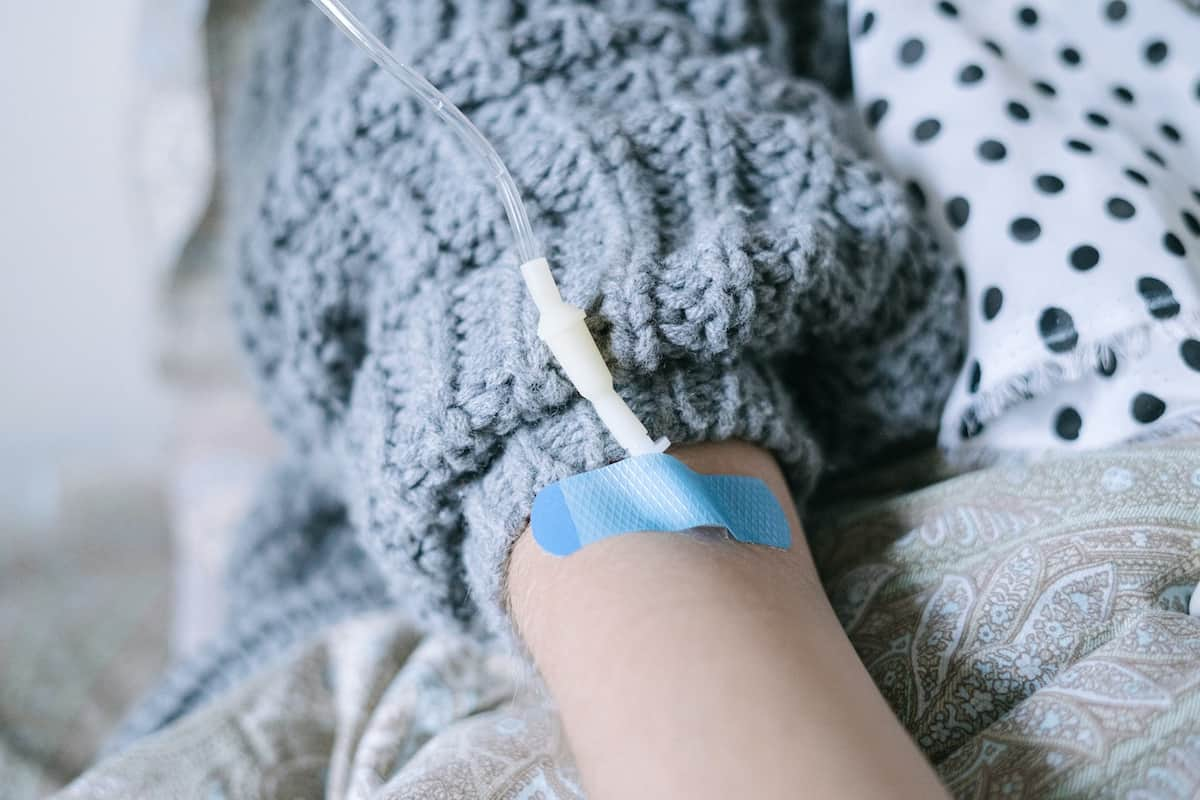
World Cancer Day encourages research and healthy lifestyles.



